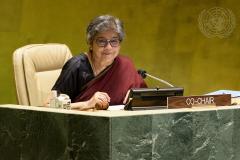- عربي
- 中文
- English
- Français
- Русский
- Español
Piloting Corporate Sustainability Reporting in LDCs: Impacts, Experiences, and Lessons Learnt: A GRI Report (2020)
rwanda_amelody_lee_world_bank.jpg

Corporate sustainability reporting can help organisations measure, understand and communicate their economic, environmental, social and governance performance, and then set goals to improve that performance. A sustainability report is the key platform for communicating sustainability performance and impacts – whether positive or negative.
This type of reporting not only can contribute to the sustainable development of the Least Developed Countries (LDCs), but it also makes good business sense as it has the potential to attract capital to the LDCs and improve LDCs' firms competitiveness and participation in value chains.
However, sustainability reporting practice is scarce in most LDCs, with no more than a handful of reports available in any one country. In order to better understand why this is, and to demonstrate the utility of these reports, UN-OHRLLS commissioned the Global Reporting Initiative (GRI) to support two companies preparing their first sustainability reports.
The completion of the two reports within about half a year demonstrates that it is possible for LDC companies to report. But with very few companies ready to embark on reporting processes, much more needs to be done to lay the groundwork.
Awareness needs to be increased among LDC business leaders on key sustainable development issues and the business case for sustainability reporting. This case must be supported with strategies and approaches that can help align business practices with sustainable development objectives.
The Sustainable Development Goals (SDGs) offer an important opportunity to engaging LDC companies on sustainable business practices, including reporting. Where they exist, local sustainability platforms are important starting points for the identification of local leaders willing and able to champion sustainable business practices and the further uptake of reporting.
![]()
Photo: A worker sorts the green leaf tea before it reaches the main processing floor, Kitabi, Rwanda. A'Melody Lee/World Bank





